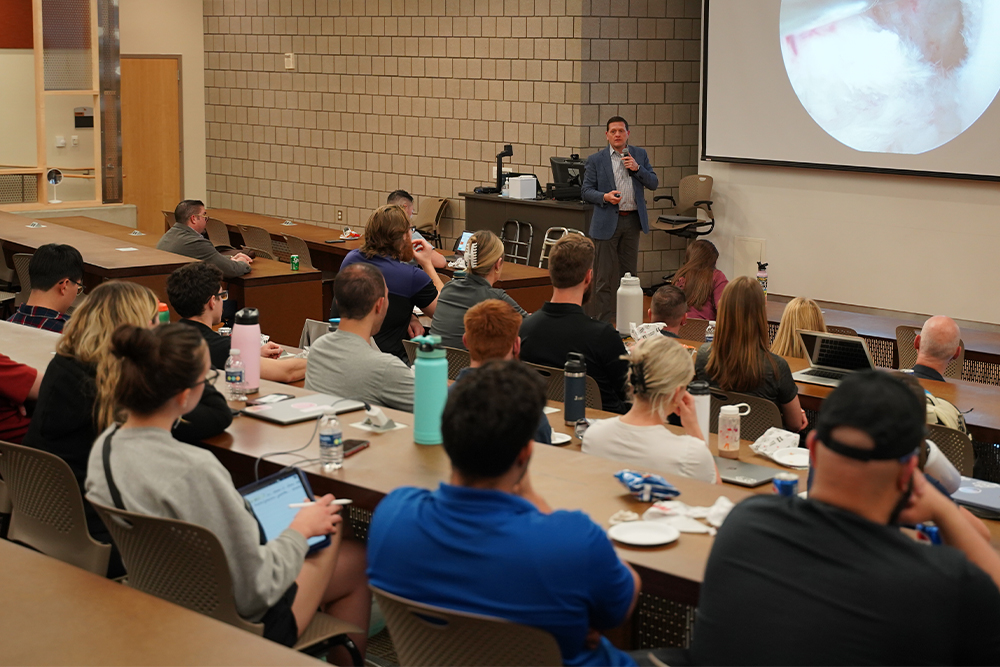
Students and clinical faculty from two Oakland University schools recently collaborated on an event designed to prepare future health care providers even better for working with real-world patients.
The inaugural interprofessional experience in orthopedics for longitudinal joint care brought together Oakland University William Beaumont School of Medicine (OUWB) and the Oakland University School of Health Sciences (SHS) Doctor of Physical Therapy (DPT).
Clinical faculty from OUWB and the DPT program explained in detail the journey of patients who have anterior cruciate ligament (ACL) reconstruction and/or total knee replacements, from pre-op indications to operative techniques, and post-op rehabilitation.
Matthew Cederman, M2, OUWB, coordinated the event along with M3 Avianna Arapovic and M2 Nikhil Aggarwal. Cederman said the hope is that attendees have a better understanding of the process from beginning to end.
“On the medical side of things, for example, I feel a lot of our learning and education stops at the end of the surgery per se, but that doesn’t necessarily stop the treatment for the patient,” he said.
“The aim of this event was to not only provide a networking opportunity for medical and DPT students, but also learn from each other’s professions,” he said.
An ‘invaluable’ link
Matthew Helou, M2, asks a question during the interprofessional event. |
Cederman said inspiration for the event came from a 2017 research paper called “Interprofessional approaching for teaching functional knee joint anatomy,” that appeared in Annals of Anatomy.
The paper examined an interprofessional teaching concept for medical students and physiotherapy students to complement existing medical curriculum at University of Freiburg in Germany.
“Evaluation of these courses showed high acceptance and appreciation among participants of both professions and participation seemed to be associated with better anatomy exam results,” the paper concluded.
It also called “strengthening interprofessional cooperation as an essential aspect of modern health care.”
At the three-hour OUWB/SHS event, James Bicos, M.D., Joesph Guettler, M.D. and Clark Yin, M.D. — all orthopaedic surgeons at Corewell Health — detailed what happens during surgery for ACL reconstruction and total knee replacement. (Bicos and Guettler are both clinical faculty at OUWB.)
“The biggest benefit from this is that we take our knowledge that we have from our own medical silos and share it with other disciplines,” said Bicos.
“By doing this, we broaden our knowledge and answers for things in a different light.”
Specifically, Bicos said he hopes DPT students took away a better understanding of the mechanical nature of the surgeries. Concurrently, he wanted OUWB students to learn what it takes to undergo rehab and the importance of rehab in relationship to patient outcomes.
“The hope is that (everyone) took away the knowledge to help them further understand the healing of their patients,” he said.
Sara Arena, PT, DScPT, director, OU DPT, was among those who spoke about the rehabilitation process post-surgery.
“It’s an outstanding opportunity for our PT students to interact with physicians because that’s certainly what they’re going to be doing when they get out into the real world of practice,” she said. “The surgeon may develop the diagnosis and do the surgery, but as physical therapists, we really are hoping to make their surgery the most successful it can be.”
“Our students being able to see that link and get that introduction is invaluable,” she added.
David Fausone, PT, DScPT, also spoke at the event and called it “super important.”
“When we’re out (treating patients) as professionals, we work together as a team,” he said. “This is a great opportunity for future PTs and future doctors to get to know each other and figure out how we work and determine what’s going to be best for our patients.”
‘A world of difference’
Sara Arena, PT, DScPT, director, OU DPT, was among those who spoke about the rehabilitation process post-surgery. |
Emilie Andrews, a third-year PT student, worked with her colleagues from OUWB on coordinating the event.
She said the main motivator for her “is creating a better environment and health care system for our patients.”
“If we have mutual respect and open communication between our two professions, this can make a world of difference for patient outcomes,” she said. “This event had so much didactic and concrete knowledge to learn, but it also helped bridge our two professions in a personal way that I haven’t experienced before.”
She said the biggest hope is that participants from both schools recognize how vital each profession is to the other.
| More from OUWB |
Founding dean of OUWB leads dissection event for ophthalmology interest group New free clinic started by OUWB student organization serves Hispanic community |
“We have a symbiotic relationship that is fostered in events like this,” she said. “We want to change the way health care and the continuum of care looks for our patients. That all begins with the next generation of professionals such as the students present at this event. We hope participants had an open mind to hearing what each profession had to share and can apply this knowledge in their everyday practice.”
Cederman said he was happy with the inaugural version of the event, hopes that it has a future at OUWB, and suggested the idea of it becoming part of the regular curriculum “to expose it to all individuals instead of those who went to the event.”
He also said the team behind the event already is at work on a research project about it with hopes to spread word about the benefits.
He added that a post-event survey will provide more insight into how attendees felt about it, but anecdotal feedback “shows that those who attended the event saw that it was very worthwhile.”
For more information, contact Andrew Dietderich, marketing writer, OUWB, at [email protected].
To request an interview, visit the OUWB Communications & Marketing webpage.
This work is licensed under a Creative Commons Attribution-NonCommercial 4.0 International License.



